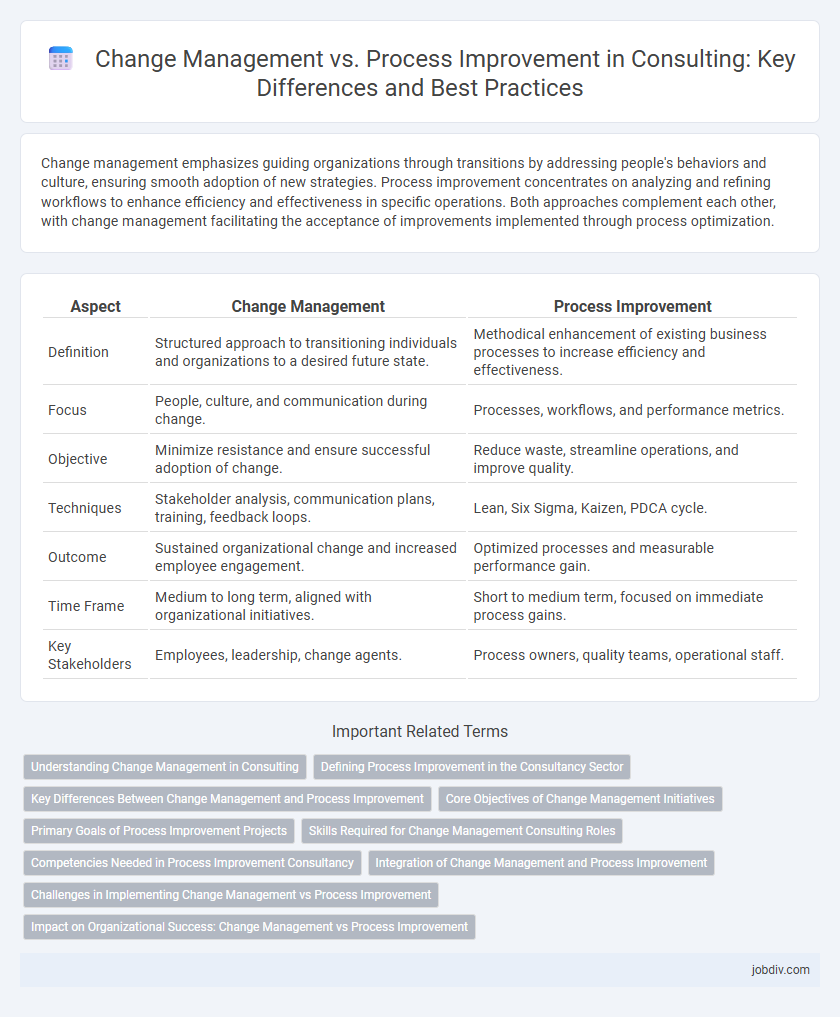Change management emphasizes guiding organizations through transitions by addressing people's behaviors and culture, ensuring smooth adoption of new strategies. Process improvement concentrates on analyzing and refining workflows to enhance efficiency and effectiveness in specific operations. Both approaches complement each other, with change management facilitating the acceptance of improvements implemented through process optimization.
Table of Comparison
| Aspect | Change Management | Process Improvement |
|---|---|---|
| Definition | Structured approach to transitioning individuals and organizations to a desired future state. | Methodical enhancement of existing business processes to increase efficiency and effectiveness. |
| Focus | People, culture, and communication during change. | Processes, workflows, and performance metrics. |
| Objective | Minimize resistance and ensure successful adoption of change. | Reduce waste, streamline operations, and improve quality. |
| Techniques | Stakeholder analysis, communication plans, training, feedback loops. | Lean, Six Sigma, Kaizen, PDCA cycle. |
| Outcome | Sustained organizational change and increased employee engagement. | Optimized processes and measurable performance gain. |
| Time Frame | Medium to long term, aligned with organizational initiatives. | Short to medium term, focused on immediate process gains. |
| Key Stakeholders | Employees, leadership, change agents. | Process owners, quality teams, operational staff. |
Understanding Change Management in Consulting
Understanding Change Management in consulting involves guiding organizations through transitions by addressing employee adaptation, communication strategies, and leadership alignment. It emphasizes managing the human side of change to minimize resistance and ensure successful adoption of new processes or technologies. Effective change management integrates behavioral science principles with strategic planning to enhance organizational agility and achieve long-term business goals.
Defining Process Improvement in the Consultancy Sector
Process improvement in consultancy involves analyzing existing workflows to identify inefficiencies and implement targeted solutions that enhance operational effectiveness. Consultants utilize methodologies such as Lean, Six Sigma, and Total Quality Management to streamline processes, reduce costs, and improve customer satisfaction. Emphasizing data-driven analysis and continuous monitoring ensures sustainable performance enhancements aligned with organizational goals.
Key Differences Between Change Management and Process Improvement
Change management focuses on guiding individuals and organizations through transitions by addressing human factors, communication, and resistance to change. Process improvement concentrates on analyzing and enhancing business workflows to increase efficiency, reduce waste, and improve quality. Key differences include change management's emphasis on behavioral adaptation, while process improvement targets operational optimization and measurable process metrics.
Core Objectives of Change Management Initiatives
Change management initiatives primarily focus on aligning organizational culture, leadership, and employee engagement to facilitate smooth transitions during transformations. Core objectives include minimizing resistance, enhancing communication, and ensuring adoption of new behaviors or systems for sustainable change. Effective change management drives long-term value by embedding adaptability and resilience within the organization.
Primary Goals of Process Improvement Projects
Process improvement projects primarily aim to enhance operational efficiency, reduce waste, and increase product or service quality. These initiatives focus on streamlining workflows, optimizing resource utilization, and minimizing errors to achieve measurable performance gains. Delivering consistent value to customers and stakeholders remains the core objective of process improvement efforts in consultancy.
Skills Required for Change Management Consulting Roles
Effective change management consulting demands strong communication, emotional intelligence, and stakeholder engagement skills to navigate organizational transitions smoothly. Proficiency in strategic planning, risk assessment, and conflict resolution enables consultants to design adaptive change frameworks and overcome resistance. Mastery of data analysis and training development further supports sustainable implementation and continuous improvement in dynamic business environments.
Competencies Needed in Process Improvement Consultancy
Effective process improvement consultancy requires a deep understanding of Lean Six Sigma methodologies, strong analytical skills for data-driven decision making, and expertise in process mapping and workflow analysis. Consultants must excel in stakeholder engagement and communication to facilitate smooth transitions and foster a culture of continuous improvement. Proficiency in project management and change management principles is essential to align process enhancements with organizational goals and ensure sustainable results.
Integration of Change Management and Process Improvement
Integrating Change Management with Process Improvement enhances organizational agility by aligning stakeholder engagement with continuous operational enhancements. This synergy ensures that process redesigns are effectively adopted, minimizing resistance and maximizing performance outcomes. Leveraging methodologies such as ADKAR alongside Lean Six Sigma facilitates a structured approach to both behavioral change and process optimization.
Challenges in Implementing Change Management vs Process Improvement
Implementing change management presents challenges such as overcoming employee resistance and aligning organizational culture with new initiatives, while process improvement efforts often struggle with identifying inefficiencies and achieving sustained performance gains. Change management requires strong leadership engagement and effective communication strategies to facilitate adoption, whereas process improvement demands precise data analysis and continuous monitoring to ensure lasting enhancements. Both approaches face obstacles in securing stakeholder buy-in and managing resource allocation efficiently throughout the transformation journey.
Impact on Organizational Success: Change Management vs Process Improvement
Change Management drives organizational success by facilitating employee adoption and minimizing resistance during transitions, ensuring strategic initiatives achieve desired outcomes. Process Improvement enhances operational efficiency and quality by systematically identifying and eliminating inefficiencies, leading to cost reduction and increased customer satisfaction. Combining both approaches maximizes impact by aligning cultural change with optimized workflows, resulting in sustainable performance gains.
Change Management vs Process Improvement Infographic

 jobdiv.com
jobdiv.com